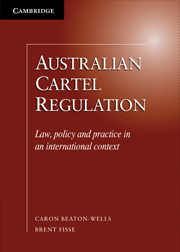Book contents
- Frontmatter
- Contents
- About the authors
- Preface
- Acknowledgements
- Abbreviations
- 1 Introduction
- 2 The legal framework governing cartel conduct
- 3 Collusion (contracts, arrangements, understandings)
- 4 Cartel and other provisions
- 5 Fault elements of the cartel offences
- 6 Individual liability for cartel conduct
- 7 Corporate liability
- 8 Exceptions
- 9 Enforcement policy
- 10 Immunity and cooperation policies
- 11 Sanctions
- 12 Compliance and liability control
- 13 Conclusion
- Appendix Trade Practices Act 1974 (Cth) Pt IV Div 1; Pt IV Div 2 s 45
- Index
8 - Exceptions
Published online by Cambridge University Press: 05 December 2011
- Frontmatter
- Contents
- About the authors
- Preface
- Acknowledgements
- Abbreviations
- 1 Introduction
- 2 The legal framework governing cartel conduct
- 3 Collusion (contracts, arrangements, understandings)
- 4 Cartel and other provisions
- 5 Fault elements of the cartel offences
- 6 Individual liability for cartel conduct
- 7 Corporate liability
- 8 Exceptions
- 9 Enforcement policy
- 10 Immunity and cooperation policies
- 11 Sanctions
- 12 Compliance and liability control
- 13 Conclusion
- Appendix Trade Practices Act 1974 (Cth) Pt IV Div 1; Pt IV Div 2 s 45
- Index
Summary
Introduction – the importance of exceptions under the anti-cartel legislation and their current state of disarray
This chapter examines the exceptions that apply to the prohibitions against cartel conduct under the TPA. These exceptions are important. First, as discussed in Chapter 4, the definition in s 44ZZRD of a ‘cartel provision’ and that of an ‘exclusionary provision’ under s 4D suffer from overreach, uncertainty and inflexibility. The exceptions create safe harbours that significantly reduce the potential scope of liability and make the law more certain and flexible than it would otherwise be. Second, some exceptions also apply to the prohibition against a provision that has the purpose, effect or likely effect of substantially lessening competition in a market. In doing so, they help to guard against the overreach and uncertainty to which that prohibition may also be prone.
The range of exceptions under the TPA today is impressive numerically but many of the exceptions suffer from underreach, overreach, uncertainty and anomalies. They are in disarray.
The problems that arise stem largely from piecemeal legislative development over more than three decades. Not long after the enactment of the TPA, the Swanson Committee Report in 1976 led to additional exceptions and changes to the scope of the authorisation process. The Hilmer Committee Report in 1993 led to fundamental changes in competition policy and the application of the TPA to governmental businesses and the professions, but the review of joint venture and other exceptions to prohibitions against cartel conduct was very limited. The Dawson Committee Report in 2004 recommended that the TPA be amended to include a collective bargaining notification procedure (implemented in 2007) and a joint venture defence for price-fixing (implemented in 2007 in relation to exclusionary provisions as well as price-fixing). The CC&OM Act in 2009 did not attempt to start from a clean slate. Instead, it chalked up more exceptions, most notably new joint venture exceptions of capricious design, and repealed the joint venture defence that had been introduced for price-fixing in 2007 but not the parallel joint venture defence that had been introduced in relation to exclusionary provisions.
- Type
- Chapter
- Information
- Australian Cartel RegulationLaw, Policy and Practice in an International Context, pp. 259 - 336Publisher: Cambridge University PressPrint publication year: 2011



